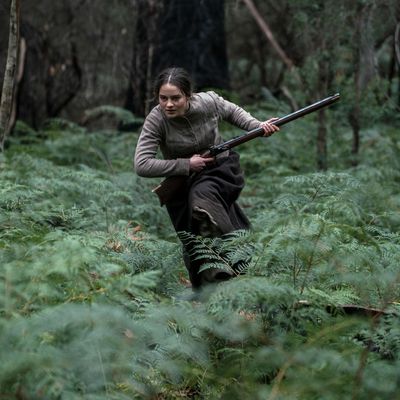
The writer-director Jennifer Kent’s rage against historical injustice fuels her second feature, The Nightingale, scorching the viewer early and often over a running time of nearly two and half hours. The setting is colonial Australia, on what’s now Tasmania, where the English use Irish prisoners as slaves and “civilize” the native population by exterminating them. The title character, Clare (Aisling Franciosi), is an Irish lass made to sing before a platoon of British soldiers, who listen to her beauteous trills while gazing on her like Sylvester does Tweety Bird. When she begs her aristocratic English patron, Lieutenant Hawkins (Sam Claflin), for permission to move away with her husband and adorable baby girl, he indignantly reminds her that she’s his property and, by way of demonstration, rapes her. After Clare’s husband gets uppity, Hawkins and two underlings (one slobbery, one decent enough to blanch) descend on the family’s shack and do just about the worst thing you can ever do to anyone and at grueling length.
Festival screenings in Sydney and Park City, Utah, prompted walkouts and denunciations — as well as denunciations of the denunciations, suggesting that male critics shouldn’t complain about the “crudeness” of a female director’s portrait of male depravity through the ages. I’d say we should agree to disagree, but the point is obviously that we can’t disagree or else we’re behaving — by default — like descendants of repressive white male colonialists. The implication is that even to look away from the atrocities onscreen would be an act of historical cowardice.
I did look away from some of the images in The Nightingale, but only because it’s constructed like a meathead melodrama — though with odd, last-act dissonances that might reflect Kent’s ambivalence. It was in exploring her ambivalence that the director found her voice in her splendid 2014 debut, The Babadook, in which the gurning storybook demon wasn’t an outside force but a manifestation of an abandoned mother’s resentment towards her unstable, demanding child. Unlike typical possession films, which involve exorcism at the hands of the Church and its male representatives, it fell to the mother herself to protect her son from the monster — and how she managed to do so was one of the great metaphors in modern horror.
Metaphor is absent from The Nightingale (unless you think Clare’s singing fits the bill) and the only inner struggle comes when vengeful Clare — pursuing Hawkins and his henchmen through the wilderness — shows her racism when forced to employ a native guide called Billy (Baykali Ganambarr). “I’m not travelin’ with a black!” she snarls — and Billy hates Clare back until she tells him she’s Irish, not English. “I hate the feckin’ English!” she exclaims, and they bond. (She is the nightingale; he calls himself the blackbird.) Meanwhile, Hawkins seems incapable of going a mile through the woods without raping or killing someone. He shoots natives, he shoots kids. He’s the sordid history of English colonialism packed into one cartoonish character.
Kent makes some original visual choices. She might have opted — in the grand Aussie tradition — for a wide, expansive frame but fashions one that’s boxy and underlit, shrinking the distances and deepening the blackness. There’s no escaping the rankness: You can almost smell the blood-soaked beds or the native children dangling from trees. Franciosi (best known for the series The Fall) turns her face into an avenging mask, which begins to melt after she draws first blood, as if she realizes this isn’t her but can’t turn back.
In the meandering last half hour (the film runs 136 minutes), Clare enters a sort of fugue state while Billy sheds his Western clothes and prepares for battle. Is it a sign of Kent’s irresolution about this traditionally male revenge genre that her female protagonist leaves the field altogether and the (non-white) male takes control of the narrative? She doesn’t explore that idea in the film, although it’s a fascinating one, suggesting that the true job of the female artist is not to bash in heads but to document historical injustice for the daughters to come. The Nightingale is her bashing in of heads.
*A version of this article appears in the July 22, 2019, issue of New York Magazine. Subscribe Now!


